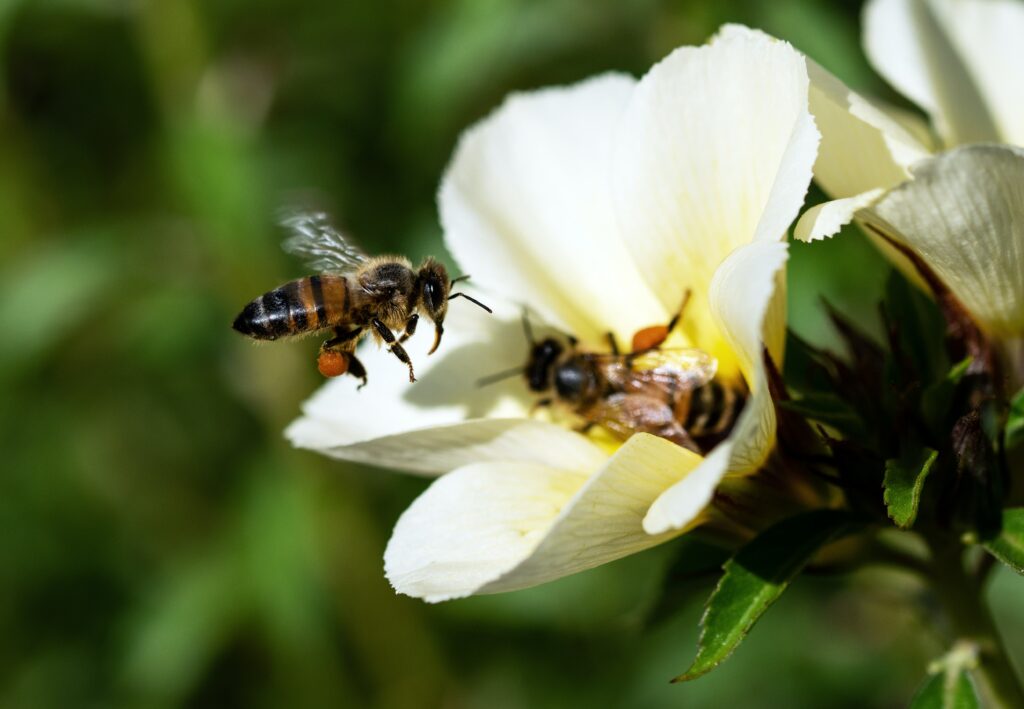Photo by David Clode on Unsplash
Na última década, a população de abelhas melíferas dos EUA tem diminuído de forma alarmante e sem precedentes. Sem sombra de dúvida essa é uma péssima notícia, pois além de nos fornecer o mel para nossa alimentação, elas são responsáveis por grande parte da produção de alimentos do mundo, através a polinização das culturas agrícolas. Emma Bryce investiga as causas potenciais para esta incidência aumentada de perturbação de colapso das colónias. Lição de by Emma Bryce, animação de Lillian Chan.
| Audio | |
|---|---|
Normal | Slow |
| English Transcript | Tradução |
| There is an environmental mystery afoot, and it begins with a seemingly trivial detail that reveals a disaster of global proportions. | Há um mistério ambiental em andamento, e começa com um detalhe aparentemente trivial que revela um desastre de proporções globais. |
| One day, you notice that the honey you slather on your morning toast is more expensive. | Um dia, você percebe que o mel que coloca em sua torrada matinal está mais caro. |
| Instead of switching to jam, you investigate the reason for the price hike. | Em vez de mudar para geléia, você investiga o motivo do aumento de preço. |
| What you find is shocking. | O que você descobre é chocante. |
| The number of domesticated honeybees in the US has been decreasing at an alarming rate. | O número de abelhas domesticadas nos EUA vem diminuindo a um ritmo alarmante. |
| This decline appears too big to be explained by the usual causes of bee death alone: disease, parasites or starvation. | Esse declínio parece grande demais para ser explicado apenas pelas causas usuais de morte das abelhas: doenças, parasitas ou fome. |
| A typical crime scene has almost no adult bees left in the hive, except, perhaps, a lonely queen and a few other survivors. | Uma cena de crime típica quase não tem abelhas adultas na colméia, exceto, talvez, uma rainha solitária e alguns outros sobreviventes. |
| It's full of untouched food stores and a brood of unborn larvae, suggesting that the adults vacated without waiting for them to hatch. | Está cheia de reservas de alimentos intocadas e uma ninhada de larvas não nascidas, indicando que os adultos saíram sem esperar que eclodissem. |
| But what's particularly eerie is that there's no tell-tale mass of dead or dying bees nearby. | Mas o que é particularmente assustador é que não há uma massa reveladora de abelhas mortas ou moribundas nas proximidades. |
| Either they have forgotten their way back to the hive, or they have simply disappeared. | Ou elas esqueceram o caminho de volta para a colmeia ou simplesmente desapareceram. |
| These mysterious disappearances aren't new. | Esses desaparecimentos misteriosos não são novos. |
| Humans have been collecting honey for centuries. | Os humanos coletam mel há séculos. |
| But it wasn't until European settlers in the 1600's introduced the subspecies, Apis mellifera, that we domesticated bees. | Mas não foi até que os colonizadores europeus em 1600 introduzissem a subespécie, Apis mellifera, que domesticamos as abelhas. |
| Since the 19th century, beekeepers have reported occasional mass disappearances, giving them enigmatic names like disappearing disease, spring dwindle disease and autumn collapse. | Desde o século 19, os apicultores relataram desaparecimentos em massa ocasionais, dando-lhes nomes enigmáticos como doença do desaparecimento, doença do declínio da primavera e colapso do outono. |
| But when in 2006 such losses were found to affect more than half of all hives in the US, the phenomenon got a new name: colony collapse disorder. | Mas quando se descobriu em 2006 que essas perdas afetavam mais da metade de todas as colmeias nos EUA, o fenômeno ganhou um novo nome: desordem do colapso das colônias. |
| The most frightening thing about this mystery isn't that we'll have to go back to using regular sugar in our tea. | O mais assustador desse mistério não é que teremos que voltar a usar açúcar comum em nosso chá. |
| We farm bees for their honey, but they also pollinate our crops on an industrial scale, generating over 1/3 of America's food production this way. | Cultivamos abelhas para o mel, mas elas também polinizam nossas plantações em escala industrial, gerando mais de 1/3 da produção de alimentos da América dessa maneira. |
| So, how can we find the culprit behind this calamity? | Então, como podemos encontrar o culpado por trás dessa calamidade? |
| Here are three of the possible offenders. | Aqui estão três dos possíveis infratores. |
| Exhibit A: Pests and Disease. | Anexo A: Pragas e Doenças. |
| Most infamous is the varroa mite, a minuscule red pest that not only invades colonies and feeds on bees, but also transfers pathogens that stunt bee growth and shortens their life span. | O mais infame é o ácaro varroa, uma minúscula praga vermelha que não apenas invade colônias e se alimenta de abelhas, mas também transfere patógenos que impedem o crescimento das abelhas e encurtam sua vida útil. |
| Exhibit B: Genetics. | Anexo B: Genética. |
| The queen is the core of a healthy hive. | A rainha é o núcleo de uma colmeia saudável. |
| But nowadays, the millions of queen bees distributed in commercial hives are bred from just a few original queens, which raises the worry about a lack of genetic diversity which could weaken bees' defenses against pathogens and pests. | Mas hoje em dia, os milhões de abelhas rainhas distribuídas em colmeias comerciais são criadas a partir de apenas algumas rainhas originais, o que aumenta a preocupação com a falta de diversidade genética, o que poderia enfraquecer as defesas das abelhas contra patógenos e pragas. |
| Exhibit C: Chemicals. | Anexo C: Produtos químicos. |
| Pesticides used both on commercial beehives and agricultural crops to ward off parasites could be getting into the food and water that honeybees consume. | Pesticidas usados tanto em colméias comerciais quanto em culturas agrícolas para afastar parasitas podem estar entrando nos alimentos e na água que as abelhas consomem. |
| Researchers have even found that some pesticides damage the honeybees' homing abilities. | Os pesquisadores descobriram que alguns pesticidas danificam as habilidades de busca das abelhas. |
| So we have a file full of clues but no clear leads. | Temos um arquivo cheio de pistas, mas nenhuma pista clara. |
| In reality, scientists, the actual detectives on this case, face disagreement over what causes colony collapse disorder. | Na realidade, os cientistas, os verdadeiros detetives deste caso, não conseguem chegar a um acordo sobre o que causa o distúrbio do colapso das colônias. |
| For now, we assume that several factors are the cause. | Por enquanto, assumimos que vários fatores são a causa. |
| Honeybees aren't necessarily in danger of extinction, but fewer bees overall means less pollination and higher food costs, so it's crucial that scientists solve the case of the vanishing bees. | As abelhas não estão necessariamente em perigo de extinção, mas menos abelhas no geral significam menos polinização e custos mais altos de alimentos, por isso é crucial que os cientistas resolvam o caso das abelhas que estão desaparecendo. |
| Because while having less honey might be a buzzkill, crop shortages are something that would truly sting. | Porque, embora ter menos mel possa ser perturbador, a escassez de colheitas é algo que realmente machucaria. |
Contagem de palavras
A tabela abaixo exibe as palavras encontradas neste vídeo, bem como o número de vezes em que aparecem.
Veja também: Para que serve esta tabela?
| Freq. | Palavra | Freq. | Palavra | Freq. | Palavra |
|---|---|---|---|---|---|
| 28 | the | 16 | of | 14 | a |
| 13 | that | 11 | is | 11 | and |
| 9 | in | 8 | to | 8 | but |
| 8 | bees | 7 | have | 6 | we |
| 6 | are | 5 | this | 5 | on |
| 5 | not | 5 | for | 4 | you |
| 4 | it | 4 | honey | 4 | food |
| 4 | disease | 3 | what | 3 | they |
| 3 | their | 3 | so | 3 | queen |
| 3 | or | 3 | no | 3 | honeybees |
| 3 | hive | 3 | exhibit | 3 | collapse |
| 3 | be | 3 | an | 2 | which |
| 2 | way | 2 | us | 2 | there |
| 2 | them | 2 | scientists | 2 | pests |
| 2 | pesticides | 2 | pathogens | 2 | parasites |
| 2 | over | 2 | our | 2 | new |
| 2 | mystery | 2 | most | 2 | more |
| 2 | mass | 2 | less | 2 | hives |
| 2 | has | 2 | full | 2 | found |
| 2 | find | 2 | few | 2 | domesticated |
| 2 | disorder | 2 | disappearances | 2 | crops |
| 2 | could | 2 | commercial | 2 | colony |
| 2 | causes | 2 | case | 2 | been |
| 2 | bee | 2 | back | 2 | also |
| 2 | about | 1 | your | 1 | would |
| 1 | worry | 1 | without | 1 | with |
| 1 | will | 1 | while | 1 | when |
| 1 | were | 1 | weaken | 1 | water |
| 1 | was | 1 | ward | 1 | waiting |
| 1 | varroa | 1 | vanishing | 1 | vacated |
| 1 | usual | 1 | using | 1 | used |
| 1 | untouched | 1 | until | 1 | unborn |
| 1 | typical | 1 | truly | 1 | trivial |
| 1 | transfers | 1 | too | 1 | toast |
| 1 | three | 1 | thing | 1 | these |
| 1 | than | 1 | th | 1 | tell |
| 1 | tea | 1 | tale | 1 | switching |
| 1 | survivors | 1 | suggesting | 1 | sugar |
| 1 | such | 1 | subspecies | 1 | stunt |
| 1 | stores | 1 | sting | 1 | starvation |
| 1 | spring | 1 | span | 1 | something |
| 1 | some | 1 | solve | 1 | slather |
| 1 | since | 1 | simply | 1 | shortens |
| 1 | shortages | 1 | shocking | 1 | several |
| 1 | settlers | 1 | seemingly | 1 | scene |
| 1 | scale | 1 | 's | 1 | reveals |
| 1 | researchers | 1 | reported | 1 | regular |
| 1 | red | 1 | reason | 1 | reality |
| 1 | rate | 1 | raises | 1 | queens |
| 1 | proportions | 1 | production | 1 | price |
| 1 | possible | 1 | pollination | 1 | pollinate |
| 1 | phenomenon | 1 | pest | 1 | perhaps |
| 1 | particularly | 1 | overall | 1 | other |
| 1 | original | 1 | only | 1 | one |
| 1 | offenders | 1 | off | 1 | occasional |
| 1 | number | 1 | nowadays | 1 | now |
| 1 | notice | 1 | necessarily | 1 | nearby |
| 1 | names | 1 | name | 1 | mysterious |
| 1 | morning | 1 | mite | 1 | minuscule |
| 1 | millions | 1 | might | 1 | mellifera |
| 1 | means | 1 | losses | 1 | lonely |
| 1 | like | 1 | life | 1 | left |
| 1 | leads | 1 | larvae | 1 | lack |
| 1 | just | 1 | jam | 1 | investigate |
| 1 | invades | 1 | introduced | 1 | into |
| 1 | instead | 1 | infamous | 1 | industrial |
| 1 | humans | 1 | how | 1 | honeybees' |
| 1 | homing | 1 | hike | 1 | higher |
| 1 | here | 1 | healthy | 1 | having |
| 1 | hatch | 1 | half | 1 | growth |
| 1 | got | 1 | go | 1 | global |
| 1 | giving | 1 | getting | 1 | genetics |
| 1 | genetic | 1 | generating | 1 | from |
| 1 | frightening | 1 | forgotten | 1 | file |
| 1 | fewer | 1 | feeds | 1 | farm |
| 1 | factors | 1 | face | 1 | extinction |
| 1 | explained | 1 | expensive | 1 | except |
| 1 | even | 1 | european | 1 | environmental |
| 1 | enigmatic | 1 | either | 1 | eerie |
| 1 | dying | 1 | dwindle | 1 | diversity |
| 1 | distributed | 1 | disaster | 1 | disappearing |
| 1 | disappeared | 1 | disagreement | 1 | detectives |
| 1 | detail | 1 | defenses | 1 | decreasing |
| 1 | decline | 1 | death | 1 | dead |
| 1 | day | 1 | danger | 1 | damage |
| 1 | culprit | 1 | crucial | 1 | crop |
| 1 | crime | 1 | costs | 1 | core |
| 1 | consume | 1 | colonies | 1 | collecting |
| 1 | clues | 1 | clear | 1 | chemicals |
| 1 | century | 1 | centuries | 1 | cause |
| 1 | can | 1 | calamity | 1 | c |
| 1 | by | 1 | buzzkill | 1 | brood |
| 1 | bred | 1 | both | 1 | big |
| 1 | behind | 1 | begins | 1 | bees' |
| 1 | beekeepers | 1 | beehives | 1 | because |
| 1 | b | 1 | autumn | 1 | at |
| 1 | assume | 1 | appears | 1 | apis |
| 1 | america's | 1 | alone | 1 | almost |
| 1 | all | 1 | alarming | 1 | agricultural |
| 1 | against | 1 | afoot | 1 | affect |
| 1 | adults | 1 | adult | 1 | actual |
| 1 | abilities |










